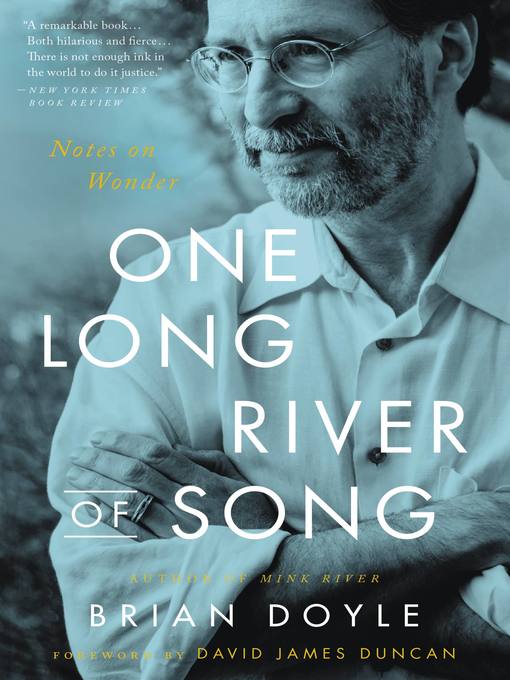
One Long River of Song
Notes on Wonder
کتاب های مرتبط
- اطلاعات
- نقد و بررسی
- دیدگاه کاربران
نقد و بررسی

September 16, 2019
The life and work of Doyle (A Book of Uncommon Prayer), the late writer and long-serving editor of Portland Magazine, are honored with this fine collection of his essays. Longtime friend and writer David James Duncan (The Brothers K) begins with an intimate introduction that situates Doyle as a literary cult figure: not popularly known, but passionately admired by some for his distinctive punctuation-defying verbal flow and his everyday epiphanies. Doyle, who died of brain cancer in 2017, trained his perceptive eye on a wide range of subjects during his career, but frequently wrote on wildlife (such as hummingbirds and sturgeon), the nature of family, and the relationship between creativity and spirituality. Doyle’s curiosity is insatiable (“you see an owl launch at dusk, like a burly gray dream against the last light, you flinch a little, and are awed...”) and his self-described Celtic-mystic disposition spots the transcendent regularly (“Time stutters and reverses and it is always yesterday and today”). As much haunted by the language of James Joyce as the lessons of Jesus, Doyle sees and celebrates what happens every day in each essay of this eclectic collection. This “best-of” should enlarge his circle of admirers.

Starred review from November 1, 2019
A posthumous collection of stunning mystical prose from the award-winning author and editor. Doyle (1956-2017) was well known as the longtime editor of Portland Magazine, but he also published multiple novels (Chicago, 2016, etc.) and numerous volumes of short stories, "proems" (hybrids of prose and poems), and essays. Though his nonfiction appeared in many renowned publications, including the New York Times, the Atlantic, and Harper's, he had a cultlike following for his lesser-known writing on spirituality. After Doyle was diagnosed with a fatal brain tumor in late 2016, David James Duncan, a friend, novelist, and essayist, proposed this collection to benefit Doyle's family. While the book may prove to be of financial value to his survivors, the richest beneficiaries will undoubtedly be those who read it. Doyle's spirituality defies categorization. He was raised Catholic and does occasionally draw from that tradition, but his catechism isn't comprised of doctrine or theology. Rather, much like Thornton Wilder's Our Town, Doyle employs the ordinary to catch the reflection of a world that is "still stuffed with astonishments beyond our wildest imagining, which is humbling, and lovely, and maybe the only way we are going to survive ourselves and let everything else alive survive us too." The author looks for God not in a book or a building but in a group of kindergarteners, at the post office, in a doll with one arm. Doyle's mysticism is similar to spiritual writers like Thomas Merton and Henri Nouwen, but his prose is informal, instantly relatable, and quite often delightfully unorthodox--e.g., "I am standing in the hospital watching babies emerge from my wife like a circus act." Though each topic spans at most a few pages, Doyle's prose is so expansive and dripping with visceral detail that even the briefest vignettes are often a wondrous adventure. This brilliant compendium of spiritual musings will resonate with people of any faith--or of none.
COPYRIGHT(2019) Kirkus Reviews, ALL RIGHTS RESERVED.

December 1, 2019
Philosopher Michel de Montaigne wrote essays in the 16th century as a form of self-exploration, seeking to examine small incidents in life in ways that drew unintuitive or enlightening conclusions. Nowhere is this endeavor better exemplified in recent times than with the writings of Doyle (1956-2017). In this collected volume of some of his most appreciated work, we see Doyle at his most mundane and profound. These two extremes, he suggests, are what make up the fabric of our existence. Doyle touches on the inherent spirituality in encounters he has with animals, trees, and people. As a positivist, Doyle focuses on the wondrous things that we have to be thankful for. Doyle was an unapologetic Catholic but not dogmatic; he saw holiness in a burbling stream, in the rapid beat of a hummingbird's heart, and in the smile of his children. VERDICT Doyle imparts a sense of breathless curiosity and joy in this blend of spirituality and philosophy; probing readers will find surprises and solace.--Brian Renvall, Mesalands Community Coll., Tucumcari, NM
Copyright 2019 Library Journal, LLC Used with permission.

Starred review from November 15, 2019
The late Doyle called the contents of this generous, posthumous collection essays although they have the rhythm of poems and the lyricism of songs. Indeed, some of the pieces are what Doyle called proems, hybrids of prose and poetry. Regardless of form, they are uniformly brief?typically one-to-three pages?although a handful are longer; for example, an 11-page elegiac essay about a summer spent as a camp counselor. The subjects range widely, from Doyle's sister's silence to a random shooting, from hummingbirds to the human heart to the Catholic mass (Doyle was raised an Irish Catholic). Few essays are overtly religious, but all are infused with qualities of spirit, goodness, and grace. Doyle was a wonderful stylist, obviously in love with series and adjectives; his three children are small, quicksilver, russet, testy, touchy, tempestuous mammals. Although love, he says, is our greatest and hardest work, he is generous, almost profligate in filling his work with it, especially when it is targeted at his children, who are small miracles because he and his wife were told that they couldn't have children but proved the doctor wrong. The book concludes with a piece called A Last Prayer ?appropriately one of gratitude, for readers will be equally grateful for this lovely book and its beautiful contents.(Reprinted with permission of Booklist, copyright 2019, American Library Association.)

























دیدگاه کاربران